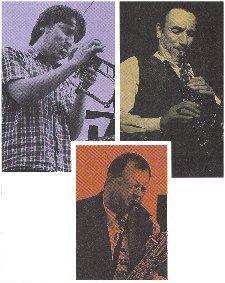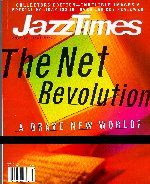APPLEBY 1998 FESTIVALREVIEW
BY JAZZTIMES USA CORRESPONDENT
Bill Shoemaker
One of the most vexing cultural mysteries of the 20th century is British jazz’s inability to gain traction in the world’s most Anglophilic nation, The US. In a country inundated with British pop culture, whose public television service is virtually a BBC affiliate, the work of such jazz greats as pianist Stan Tracey and alto saxophonist Peter King is all but unknown to even well-versed American jazz fans. The few British artists who have seeped into the American jazz psyche only suggest the richness of the British jazz and improvised music scenes. Pick any style or sub-genre; the UK has numerous active world-class exponents with little to no name recognition world-wide; yet several would be contenders for the pantheon had they hailed from the US.
However, British jazz and improvised music has its own Field of Dreams in the Appleby Jazz Festival. Through its commitment to exclusively present British artists, the 10 year-old festival provides a unique opportunity to hear the best players from three generations mixed and matched in various ensembles during 36 hours of music offered over three days. The long weekend in this far-from-the-maddening-crowd-of- tourists village in Cumbria is also a tonic for the musicians, many of whom return regularly, if not annually. As a result, the Appleby jazz Festival evolves from year to year in ways that festivals with an international scope simply can not. The site is idyllic, a field on the banks of the river Eden under a sandstone cliff. Huge blue and white striped marquees cover the main stage (including seating amid a large bar area) and the eatery/disc mart, the space between them scattered with tables and chairs. Saxophonist Evan Parker’s Freezone, housed in The Redundant St Michaels Church (an old vacated Anglican church built on a Viking site, bought by artists in the early ‘70s), was just up the hill, a stone’s throw from The Royal Oak Inn, where bitters and bacon rolls fuel after-hours hangs. Hearing so much music in a sprawling urban festival would he a logistical feat; at Appleby, it is effortless.
In a festival featuring a wide spectrum of established stylists as pianist Gordon Beck and guitarist Martin Taylor, and new groups like Septpiece, whose fresh strings-augmented sound was a fine Sunday starter, the linchpin of the main stage’s programming was Tracey’s stellar Octet; one or more of its mostly leaders-in-their-own-right members took part in eight of the eighteen main stage sets, while King and trumpet/flugelhorn phenom Gerard Presencer also ventured into Parker’s Freezone. Rounded out by trombonist Malcolm Griffiths, tenors Art Themen and Mornington Lockett (subbing for an ailing Don Weller), bassist Andrew Cleyndert, and drummer Clark Tracey, this veteran unit is the perfect vehicle for the 72-year-old Tracey’s singular compositional gifts. Pieces like the rollicking ‘Rocky Mount’ built from a core Monk piano lick, and the sprinting ‘Clinkscales’, a swirl of Ellington and ‘Giant Steps’ era Coltrane flavours, exemplify Tracey’s exclamatory swing and sleek lyricism. Tracey delved even deeper into his masterful synthesis of the Ellington-Monk piano nexus in a quartet featuring the wryly understated tenor of Bobby Wellins.
In addition to squeezing every last BTU from the ensembles, Tracey’s cohorts constitute a vividly contrasting set of improvisors which made their work in other settings all the more engaging. In a strong trio set with the aptly named drummer Bryan Spring and bassist Nick Hutton, Themen took Hank Mobley’s ‘This I Dig of You’, at a much faster tempo than the original, spooling out the intricate lines he favours with Tracey, and piquantly quoting other tunes.
With tenor saxophonist Tim Garland, the twentysomething Presencer applied the soaring sense of line that highlighted his work with Tracey to such harmonically open pieces as Ornette’s ‘Rejoicing’, spurred by Dave Barry’s scrappy drumming. With his own hand, Platypus, Presencer successfully went for a fatter, bluesier sound reminiscent of Freddie Hubbard’s early 70s quintet with Junior Cook. Fronting his own quartet, King simply atomized blowing vehicles like Victor Feldman’s ‘Joshua’, and proved to be a suave balladeer.

The performances of reedman Alan Barnes and pianist David Newton were the other bright strands running throughout the main stage program. Barnes kicked off the fest with a singeing Jackie Mac alto attack sitting in with Hydrazine, an earnest pack of young lions. Just two sets later, Barnes and Newton ran with King and Themen through an exhilarating set of war-horses like ‘Tenor Madness’ with Barry stoking the fires, Barnes boldy switched to clarinet for a keening ‘Donna Lee’. Playing baritone in a quartet set featuring Newton, Barnes brought an uncommon muscularity to cool school pieces like Mulligan’s ‘K-4 Pacific’. On the final night, Newton pulled out some monster chops in a trio set with Barry and bassist Arnie Somogyi setting up the fest’s rousing finale featuring Barnes, King, and Tracey.
In the course of two afternoons in the Freezone, Parker not only assembled a striking cross-section of success - violinist Phil Wachsmann and guitarist John Russell have been active for decades while percussionist Mark Sanders and bassist John Edwards have made their marks in just the past few years), but, by inviting King and Presencer to sit in, bridged the ideological gulf between jazz and improvised music. Constructing programs with ample portions of solos, duos, and trios, Parker built sets accentuating each player’s strengths. Wachsmann’s solo piece brimmed with electronics-enhanced sensuousness, yet in duet with Parker, he was ruthlessly virtuosic, often pushing the pace of Parker’s circular breath-driven soprano cascades. In duet, Russell and Edwards demonstrated how starkly compelling an improvisation rooted in attack and texture can be, yet, in larger groupings, the same techniques were deftly subtle. While Sanders’ solo pieces possessed strong design elements, he ricocheted about Edwards and Parker’s tenor in a free-flowing trio that served as preamble to the culminating quintet with King and Presencer. Beyond its symbolic gravity, this quintet produced music worthy of the phrase ‘summit meeting’. Neither King nor Presencer plied his stock in trade in this setting, nor affected free music stereotypes, conversely, Parker, Edwards, and Sanders were initially more deliberate. It was an honest dialogue. Intriguingly, it was King who set the piece on an ultimately exultant course, as its prelude-like musings gathered steam, King instigated long tone voicings with Presencer which dovetailed Parker’s tenor statement towards the boiling point. King and Presencer then peeled off in different directions, yet retained a front-line cohesion as the collective polyphony became more urgent and abstract. Lasting less than 30 minutes, this momentous performance will probably survive only as an aside in the annals of jazz and improvised music in the U K, and, when all is said and done, it will probably be just one of many such entries facilitated by the Appleby Jazz Festival.
